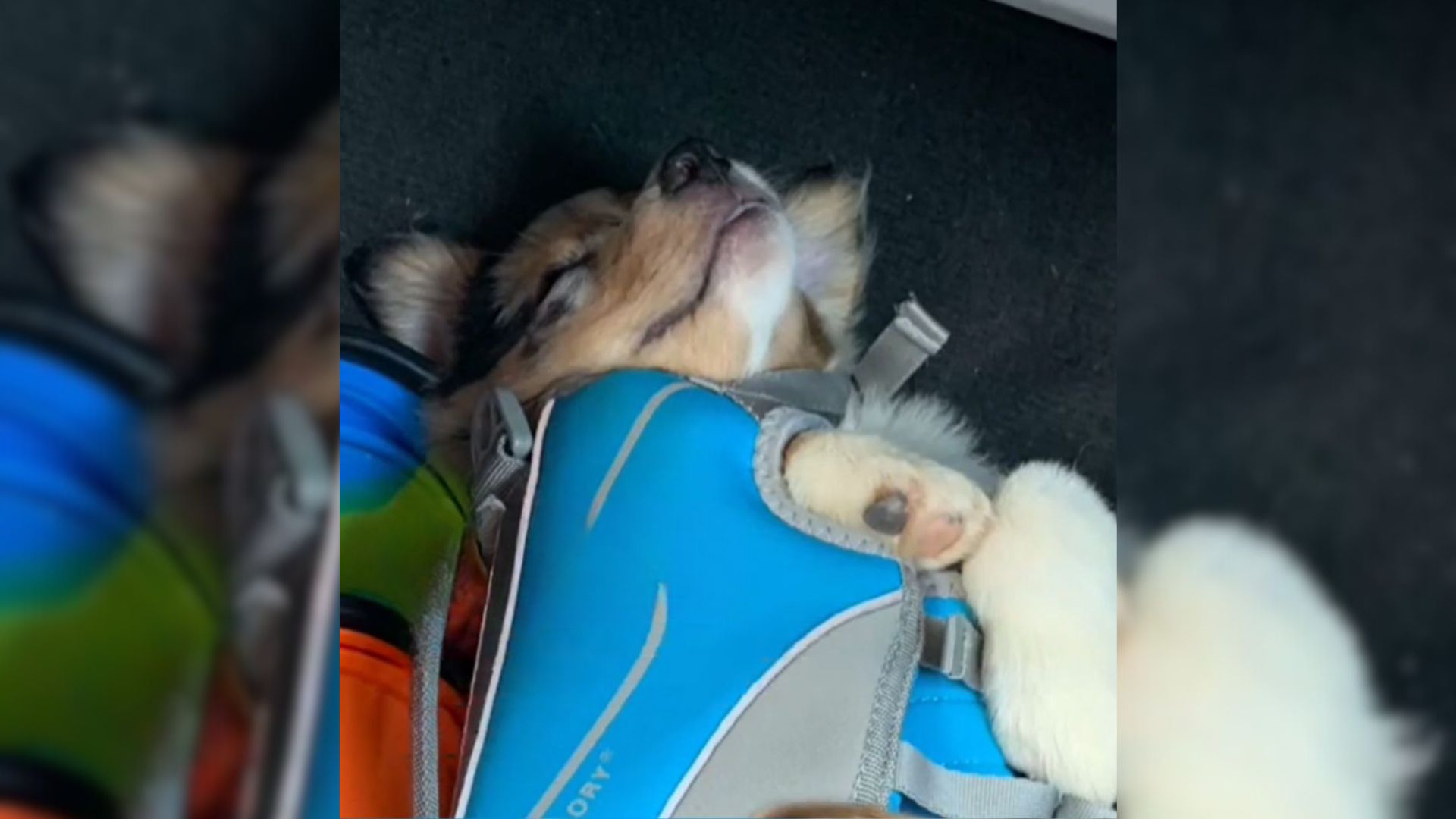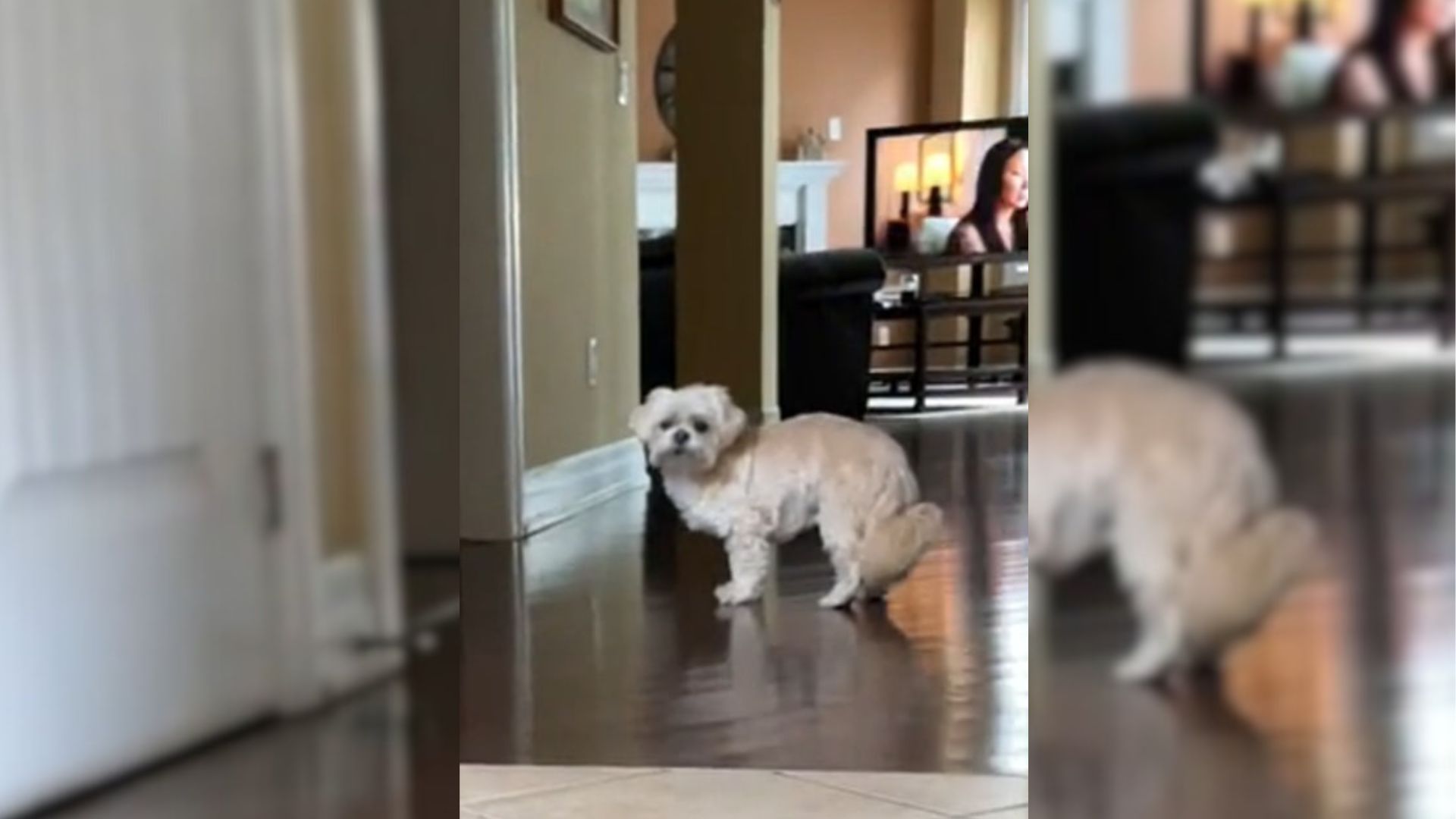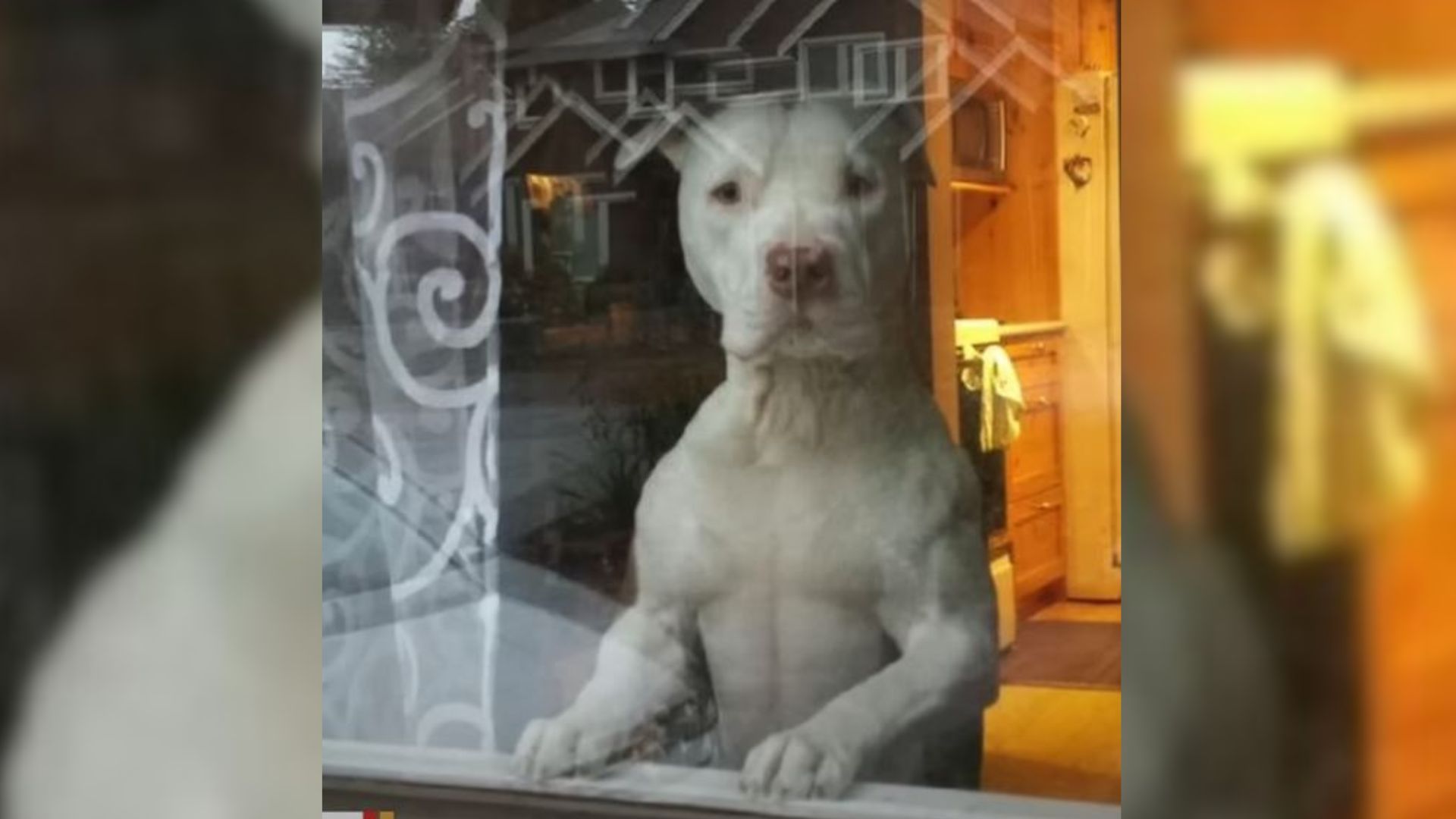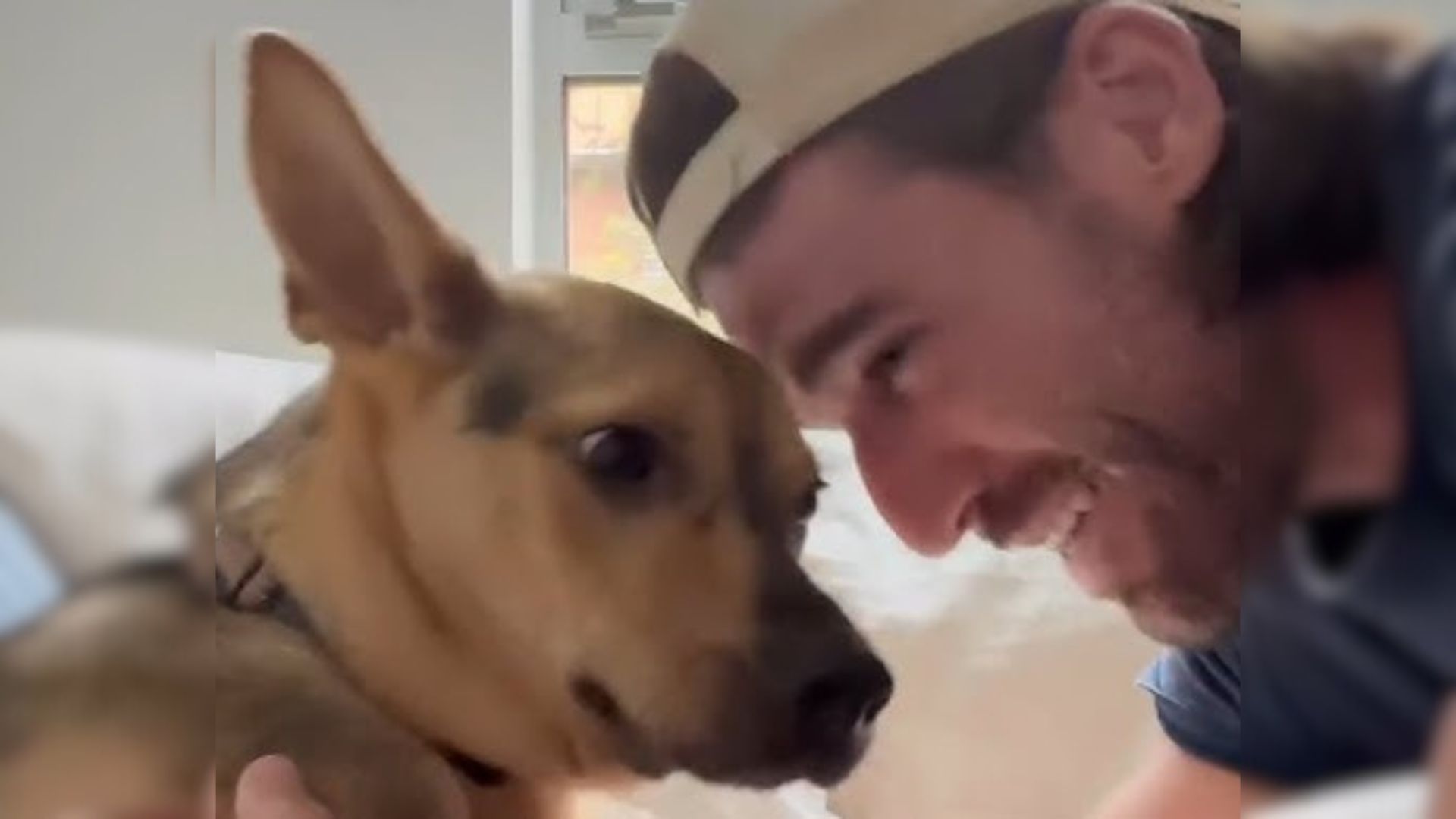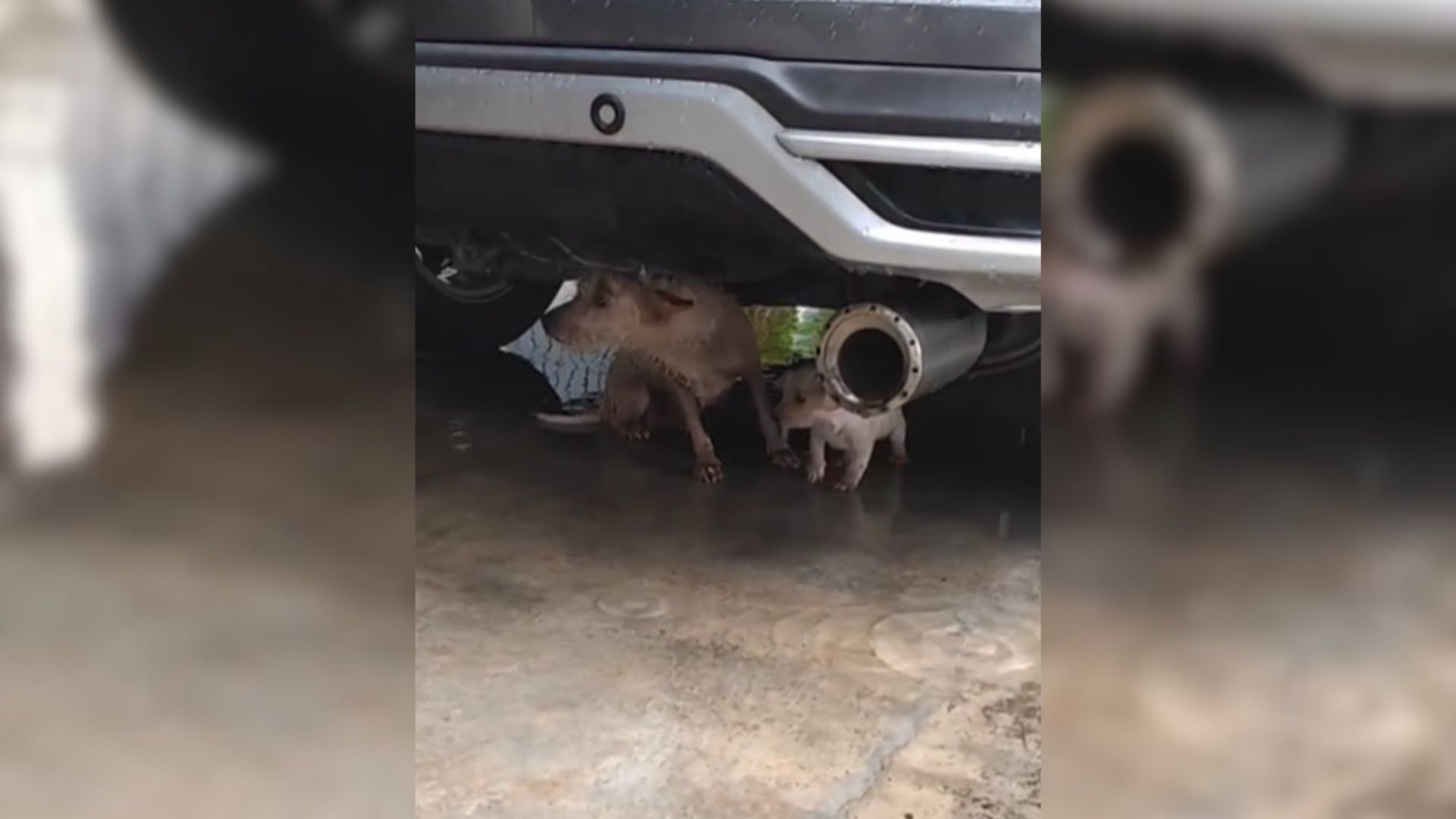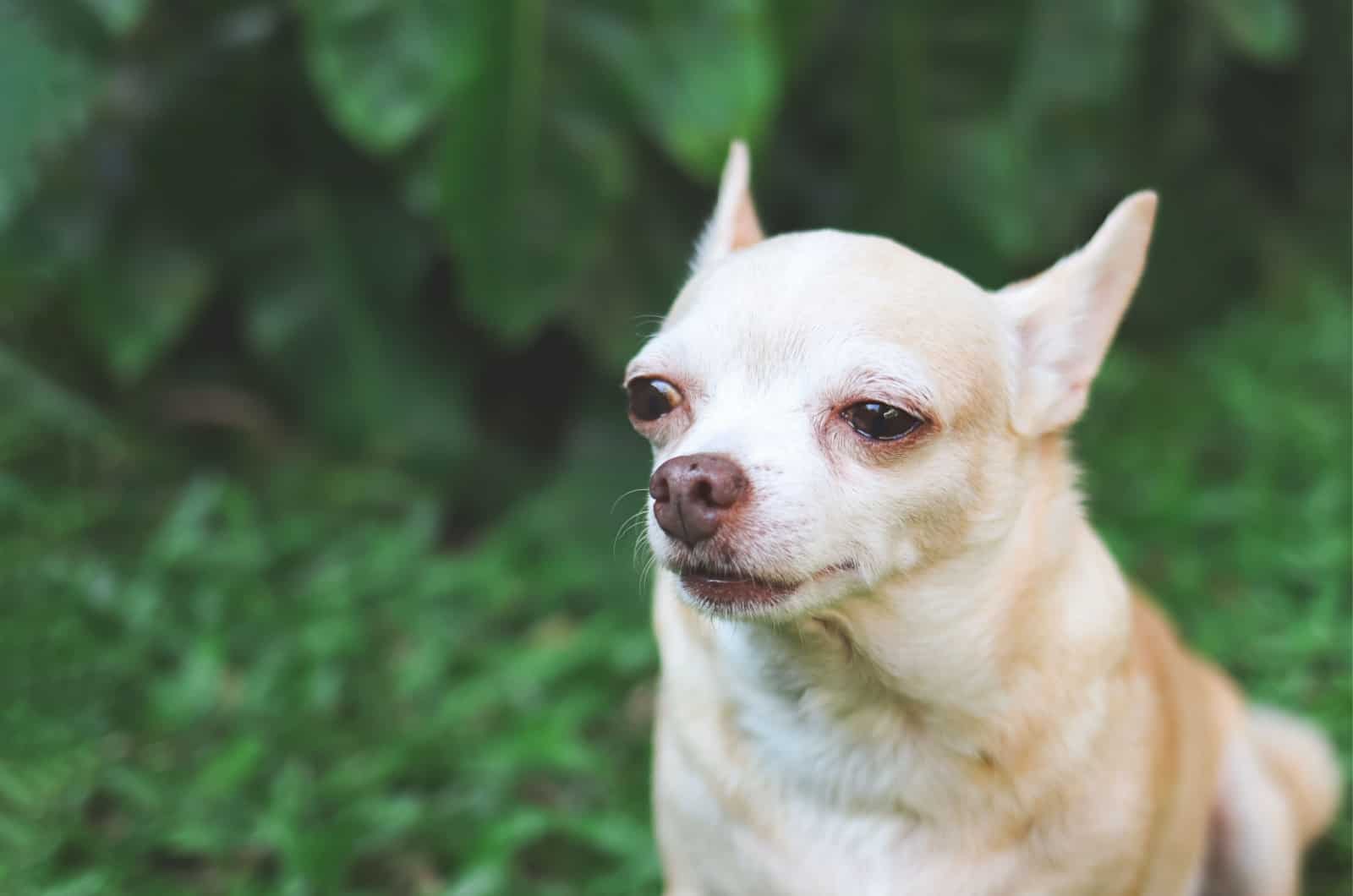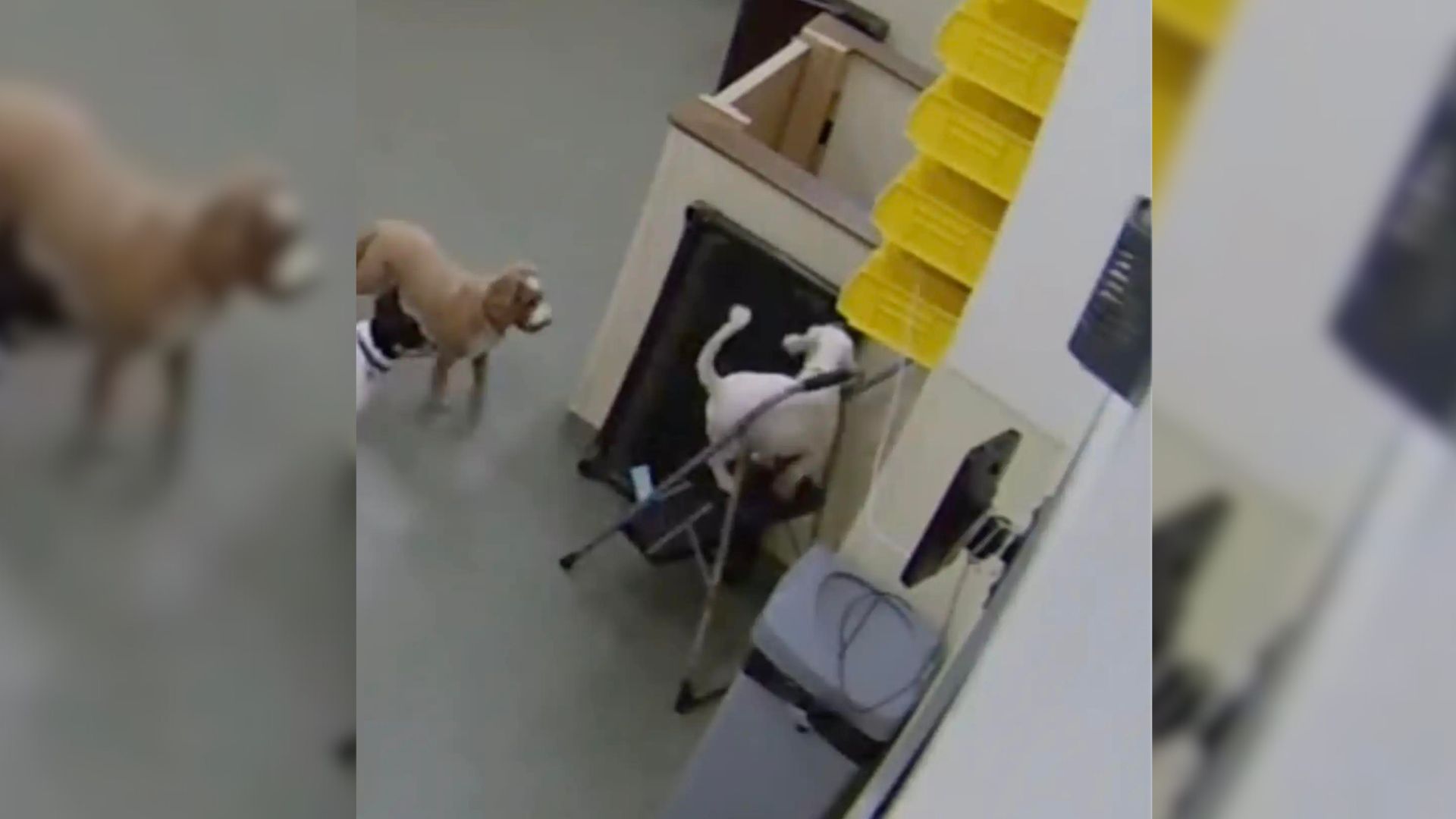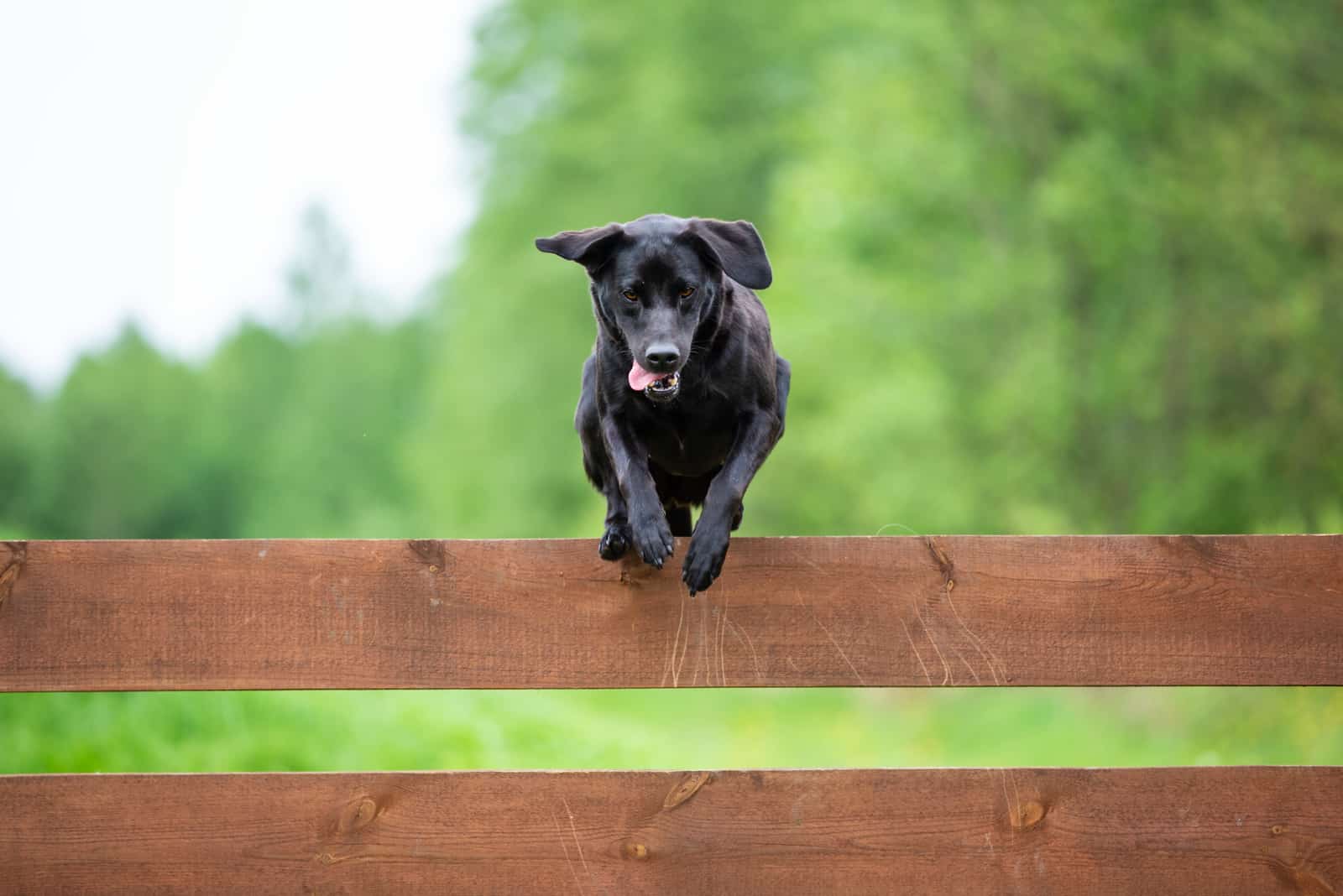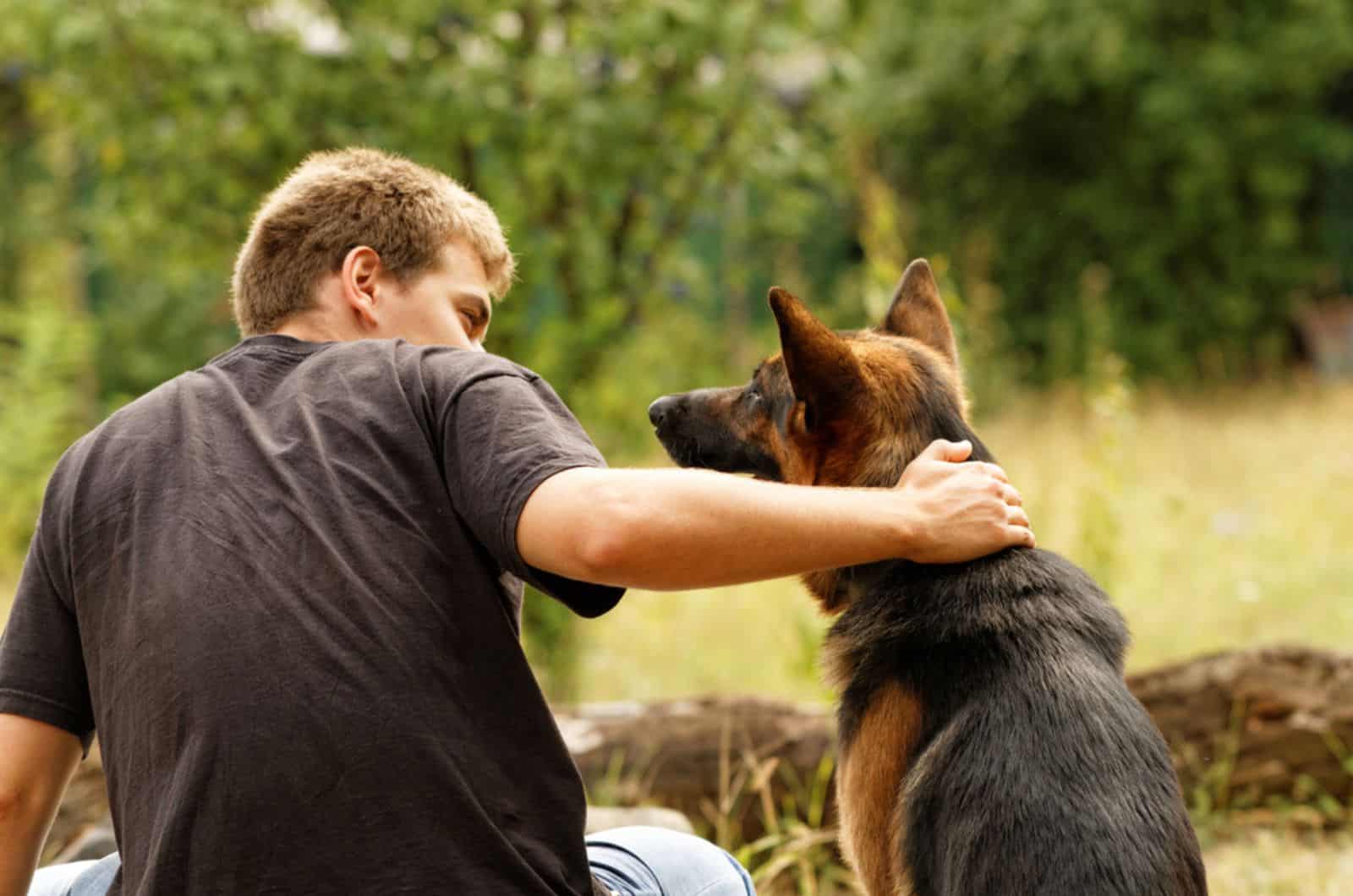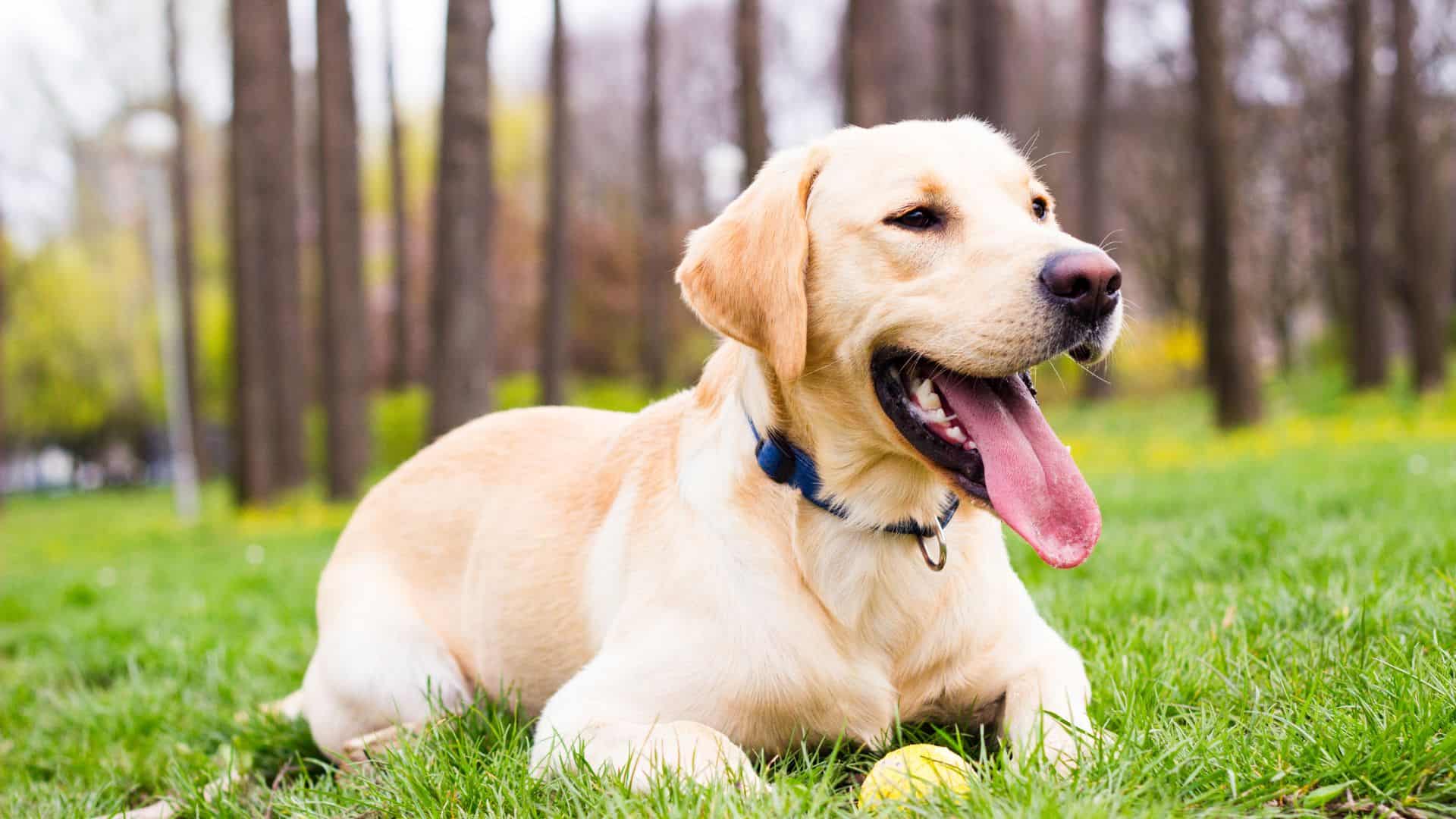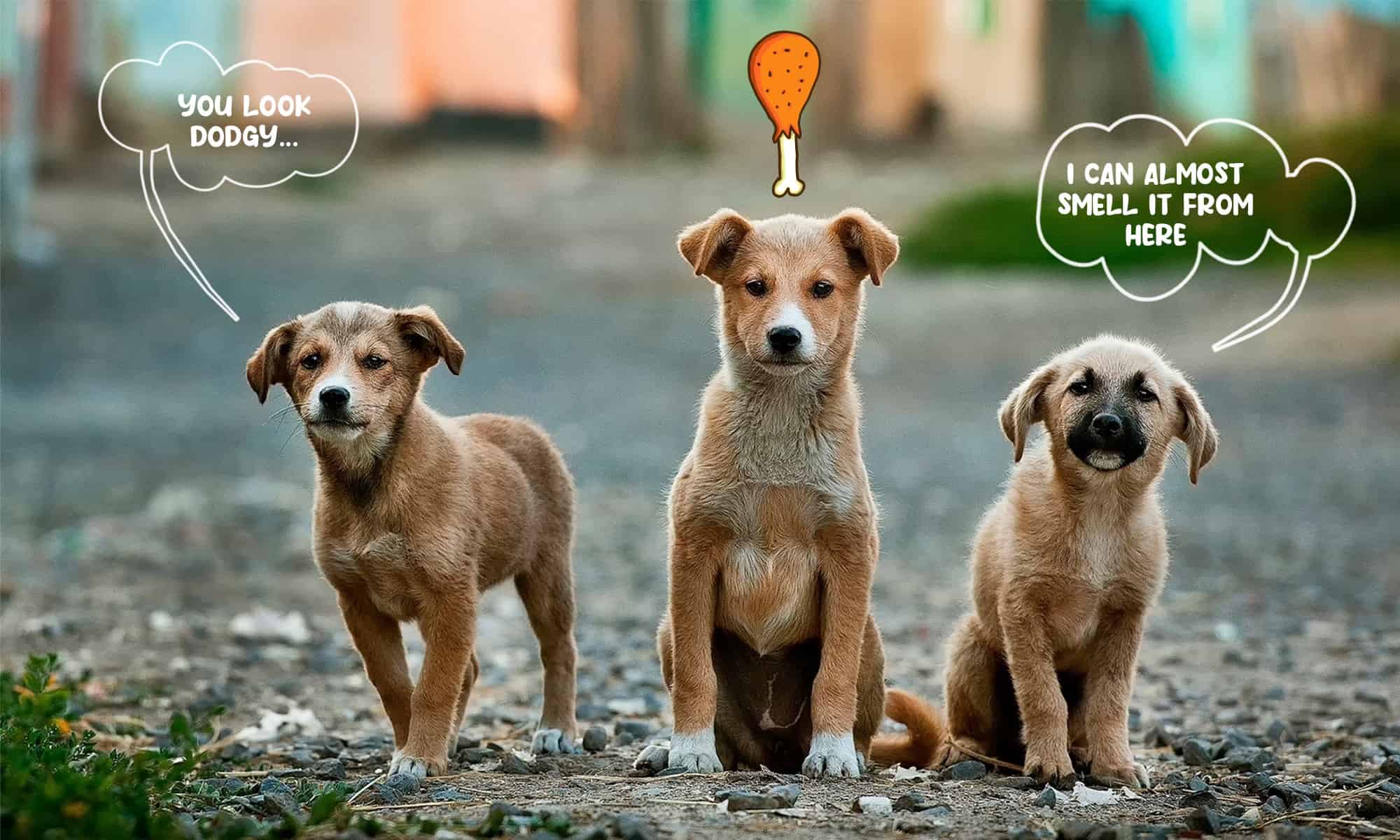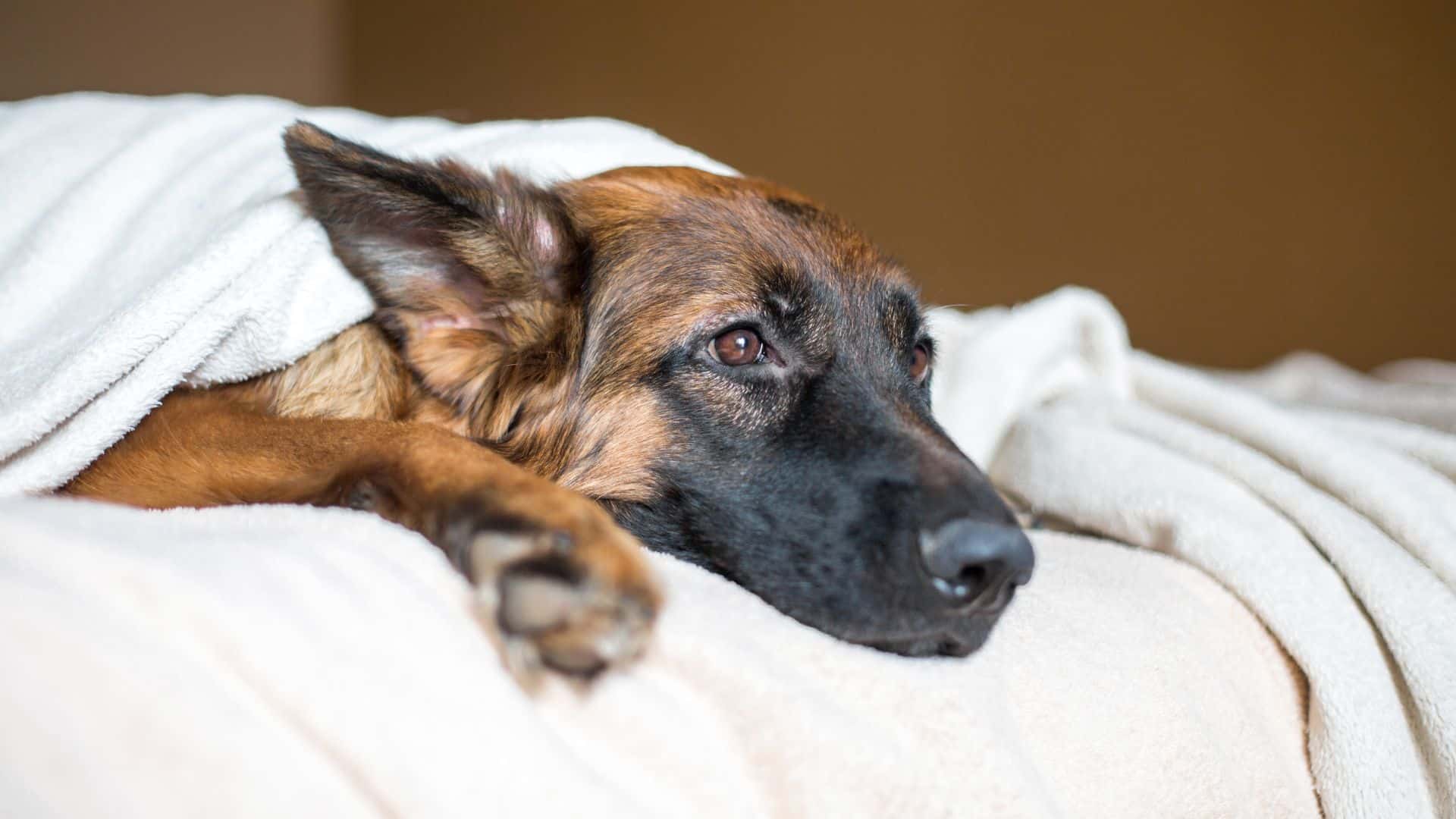Everyone knows that puppies are adorable. When they’re awake, they are always up to something: playing, tumbling, yapping, exploring, eating, chewing, pooping, pouncing, etc.
And when they’re asleep, they melt our hearts with their cuteness.
Even so, they can be hard work! If you’re a new puppy parent, you may be realizing this by now. From the time you bring it home, your pup needs constant attention and care, which can be a real challenge.
It feels like you never have time to perform your daily tasks and look after the pup! And nighttime can be a drag when your fur baby wakes you up every couple of hours.
Maybe you thought that having a pup would all be fun, laughter, and cuddles? But now your precious pooch is driving you insane.
So, you’re probably wondering, when do puppies get easier?
If this sounds like you, give yourself ten minutes to relax and take a break. Make yourself a coffee (or a drink of your choice!), settle down somewhere comfortable, and check out our guide for new puppy owners.
When Do Puppies Get Easier?
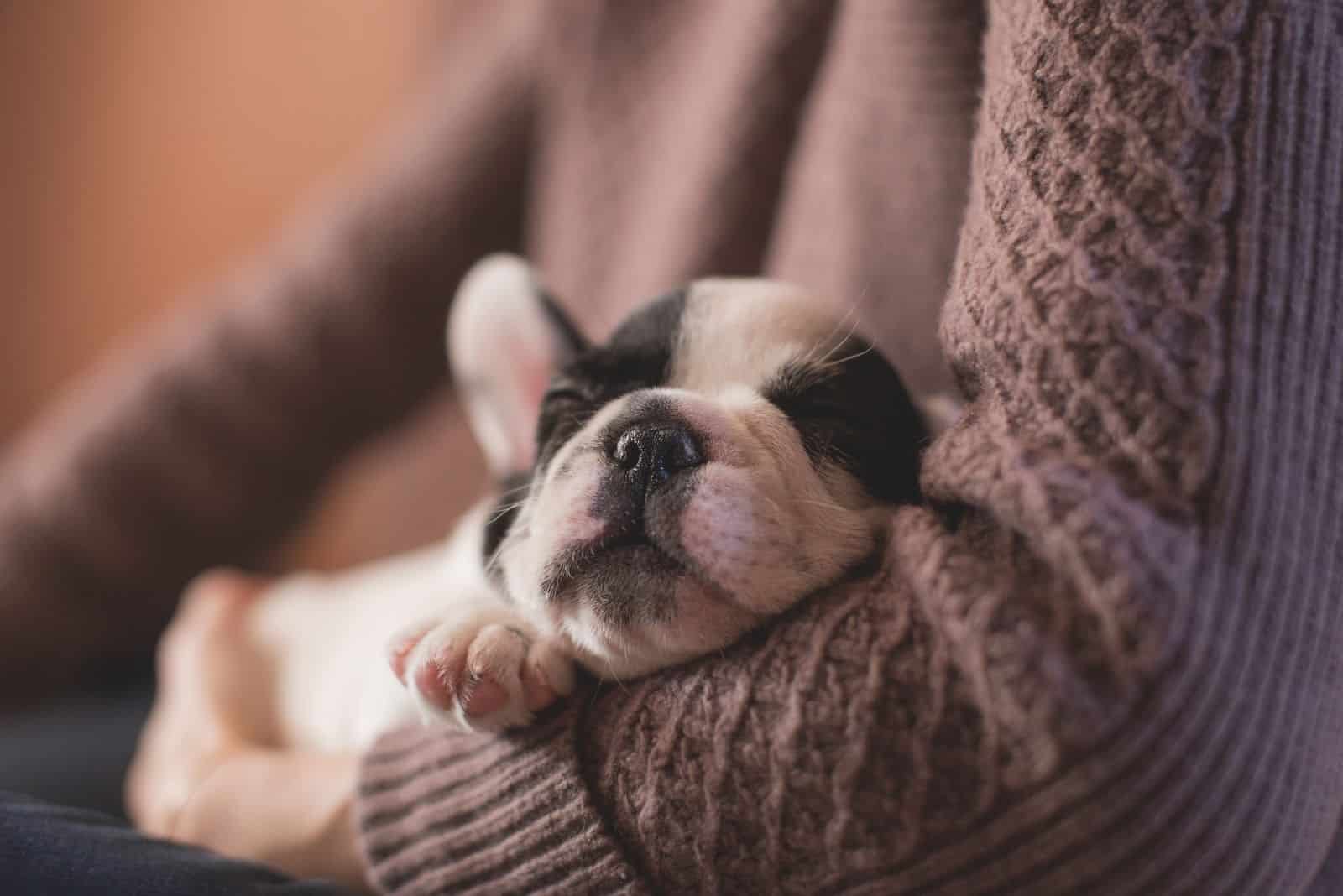
Opinions vary, but on average, you should expect things to ease up in between six and twelve months.
The truth is, there isn’t a set age for when pups get easier. It depends on the dog breed and each pup’s character and personality.
The dog’s sex also plays a part, as girls almost always mature before boys. There are also several other factors that we’ll investigate later.
First of all, don’t panic! You may feel like you’re going through hell right now, but it won’t last forever, we promise.
With this in mind, let’s dive into the world of puppy behavior to understand what’s going on.
Early Days
It’s important to understand that puppyhood is an important time in a dog’s development. A pup’s body and mind are shaped during these stages, determining its health, size, and personality as an adult dog.
Pups have a powerful natural bond with their mother that lasts for around ten to twelve weeks. During this time, the mother feeds, cleans, and weans* her litter, teaching them essential skills and keeping them in check when they step out of line. Pups also interact with their littermates, forming a vital part of their learning process.
*This happens naturally in the wild, but obviously, humans lend a hand weaning domesticated dogs. Even so, some mother dogs will regurgitate food for their pups in the weaning stage, which is nothing to be alarmed about.
Some of the best dog breeders keep pups with their mother for at least ten weeks, sometimes allowing the entire twelve-week cycle to be completed naturally. However, most breeders release them at eight weeks, the accepted limit for taking a puppy home.
Irresponsible breeders (including puppy mills and pet stores) sell pups way too young, which is unacceptable: puppies should never leave their mother before eight weeks of age!
While the pups might be unbelievably cute at this young age, they are not ready to leave their mom. Separating them before the eight-week mark will almost definitely cause behavioral problems and may even lead to health and development complications.
It’s essential to remember that you are taking the place of their mother, and it’s up to you to fulfill that responsibility, giving your pup the best care and attention possible.
Our guide will show you ways of coping with the situation and how to help your pup through the worst parts.
How Long Do The Puppy Blues Last?
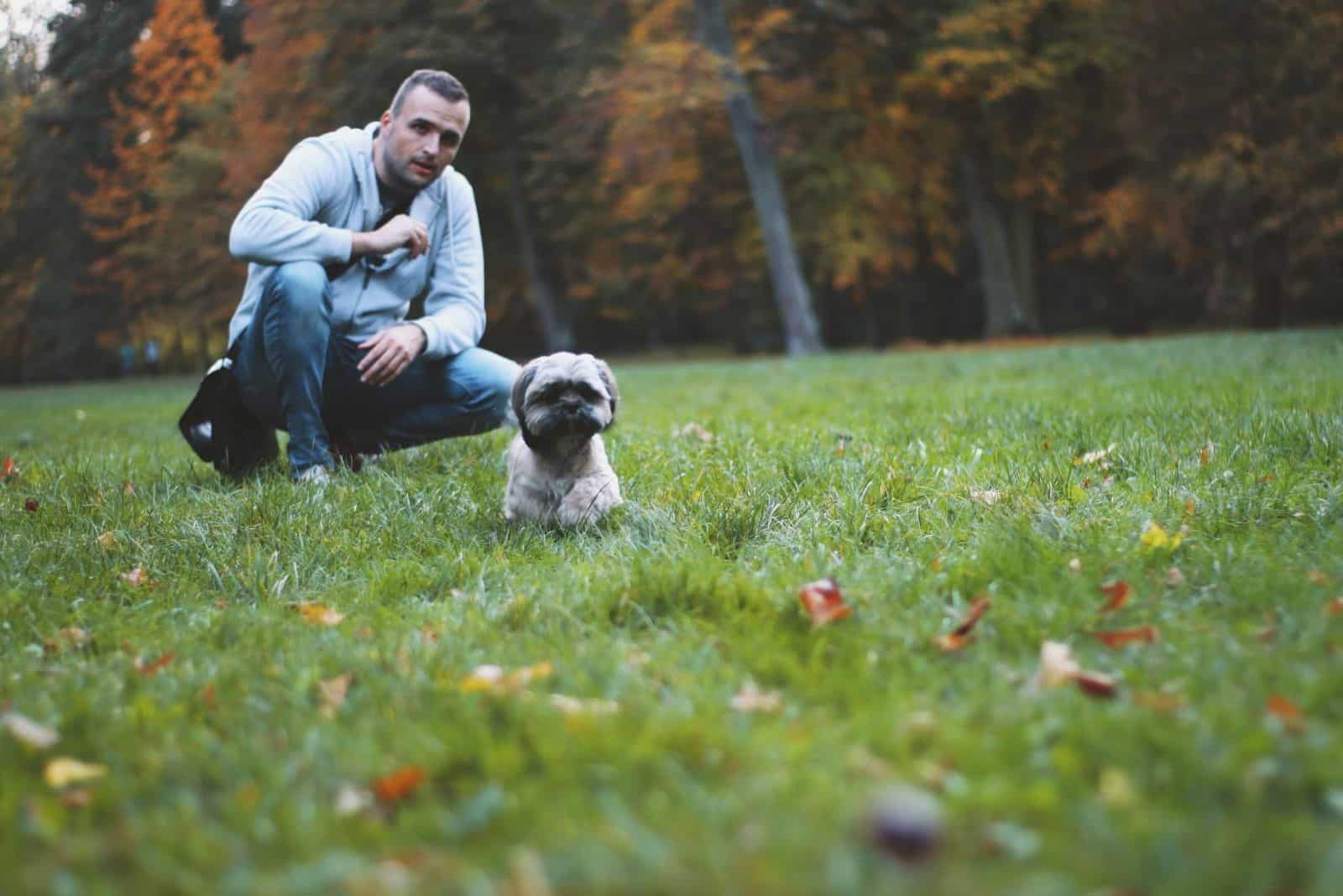
Before getting your pup, had you heard of the puppy blues?
No, not many people have!
You’d be forgiven for thinking that it’s something that affects the puppy itself, but you’d be wrong.
Since getting your new puppy, have you felt helpless, angry, emotional, desperate, lonely, overwhelmed, anxious, or depressed? You’re not alone! You probably have the puppy blues.
While it’s not much fun, it’s pretty normal, and it shouldn’t last too long. Most people feel that they’ve made a big mistake getting a pup, especially first-time dog owners. And then they have a guilt trip because of this!
If this sounds familiar, listen up: your life has been turned upside down. Everything changed the moment you brought that little bundle of fur home. It’s affected every part of your life, including your daily schedule, social life, personal relationships, and family dynamic. Even your home has changed, in terms of the atmosphere but also in practical ways, with all the equipment you need to care for your pup strewn around the place. You may have even puppy-proofed your home, so it’s all different.
Then there are the restless nights. Sleep deprivation can affect your mental state and make you feel worse.
Here’s a list of the typical issues that contribute to the puppy blues:
• Financial worries – owning a dog costs a lot of money. It’s a good idea to fix a budget and stick to it as much as possible.
• Disappointment – you may have had unrealistic expectations about your pup and not realized how hard these first few months would be.
• Regret – did you make a mistake getting a pup? Many first-time puppy owners ask this question!
• Potty training – it sometimes feels that they’ll never learn to poop in the right place.
• Responsibility – realizing that this life is in your hands can put you under pressure.
• Puppy biting – puppies explore their world with their mouths and bite, nip, and chew excessively.
• Damage – unless you puppy-proofed the whole house, your stuff will get chewed. Whether these items have monetary or sentimental value, the results are the same: you’re upset and angry with your pup!
• Teething – it’s a traumatic time for both you and your pup as they are suffering, so you don’t get much sleep.
• Behavioral problems – some dogs are willing to learn and eager to please. Others are stubborn and willful, making your life difficult.
• Sleepless nights – your pup will get lonely, especially in its first week or two away from mom, and will cry at night. It may need to go to the bathroom at night or get sick from eating something it shouldn’t have. Either way, you get a restless night.
Here’s the good news for anyone wondering, when do puppies get easier?
This stage will pass.
As you and your puppy settle into a routine, you’ll begin to feel easier in your mind about everything. The first two or three weeks are usually the hardest, but with perseverance, you’ll get there. You aren’t selfish to think this way, you aren’t the worst puppy parent in the world, and you’re no monster. It’s only natural and normal to react like this, and soon it will be a distant memory.
Of course, it helps if your puppy is well-behaved and begins to calm down.
So, when can we expect this to happen, and what other challenges will there be?
What Age Are Puppies Most Difficult?
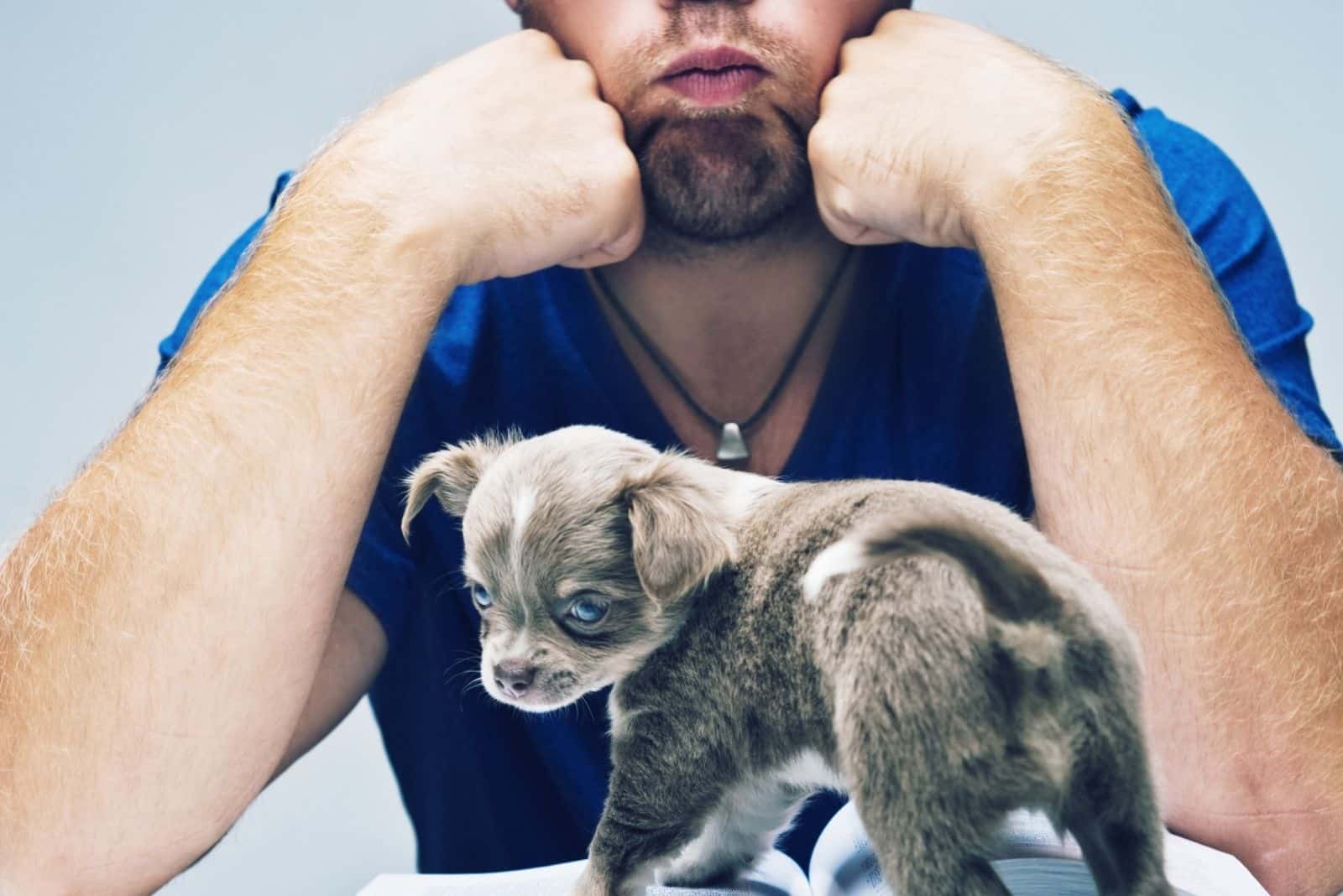
There’s no ready answer to this, as all dogs are different. Even so, there are particular stages to watch out for:
Teething Pains
Puppies go through two teething stages. They are born toothless, as they suckle from their mother, and the teeth aren’t needed (because, ouch!).
Their baby teeth are usually called deciduous or needle teeth, for a good reason! They really are like little pins. They start to appear after about two or three weeks, and between eight and ten weeks of age, they will be fully formed. The pups will be weaned and almost ready to leave the litter by this stage.
These pin-like teeth begin to fall out between four and six months of age, replaced by permanent teeth. This process generally occurs later in smaller breeds as they keep their baby teeth for longer, and some small breeds go through this stage between seven and eight months of age.
In general, most dogs will have their adult teeth by six or seven months.
However, at various times over those first few months, your pup will be in pain as his teeth erupt and grow. His jaws will ache, his gums will be sore and irritated, and he will drool and chew on anything and everything in sight.
How To Help With Teething
Check out these tips to ease your pup’s suffering and make life easier for everyone.
• Get a variety of chew toys – plush toys, KONG toys, chilly bones, etc., are all great choices.
• Use natural remedies – as well as toys to chew on, you could give your pup frozen strawberries or bananas. Pieces of cold carrot work well, too. You could even use a wet towel twisted into a knot. Cold stuff eases the pain and irritation, and the fruit is a welcome treat.
• Tidy up – this isn’t a comment on your housekeeping! It’s friendly and helpful advice that could save you much hassle, heartache, and money. Pups have no concept of value and will just as happily chew on a pair of Dior shoes or a Gucci purse as they would on a plush toy. Remove anything from within reach of your puppy that you want to remain in one piece.
• Check with your vet – there’s no harm in consulting your vet if you have concerns. They may prescribe something to help your pup (never use over-the-counter medication without getting advice!). A quick check-up will help find and fix any dental problems early.
• Don’t use ice cubes! – crushed ice is one thing, but ice cubes are too hard and may damage your pup’s teeth.
Your pup will whine, bite, chew, and drool during the teething process. Don’t worry if the saliva contains blood or you find tiny teeth around the home. He’ll likely swallow most of his baby teeth while eating, which is entirely safe and normal.
It’s advisable to get your pup used to having his mouth handled and his teeth touched. This will make it easier to clean those teeth once they’re all safely through. Gradually introduce him to the feel of a doggy toothbrush and then a toothpaste a little later (never use a brand designed for humans).
Regular brushing will keep tartar at bay and reduce the risk of dental problems. And it will keep your pup’s breath fresh, which is a bonus!
Puppy Biting Behavior
All puppies bite and chew; that’s a fact of life.
Dogs explore their world using their eyes, ears, nose, and mouth. While we have handy appendages to feel and touch things, dogs don’t share this feature. They use their mouths to investigate textures and tastes from the very start.
They also use mouthing when playing with their siblings, and this is when they would naturally learn bite inhibition. If they bite too hard, their littermate protests by yelping (and possibly retaliating). The mother dog sometimes intervenes, checking the pup with a swift jab of her muzzle or a sharp yap.
Bite inhibition is when a dog learns how to judge the right amount of pressure when using its mouth for different purposes.
As you have taken the place of the mother (and she may not have had time to teach her youngster), you must now show them that it’s not okay to bite your fingers hard, even if they are teething. If they nip you hard during playtime, stop everything and make a sharp yelp sound, just like the pup’s mother or sibling. Give your pup a time-out in his crate for about ten minutes so he knows that he’s done wrong.
The Trials Of Potty Training
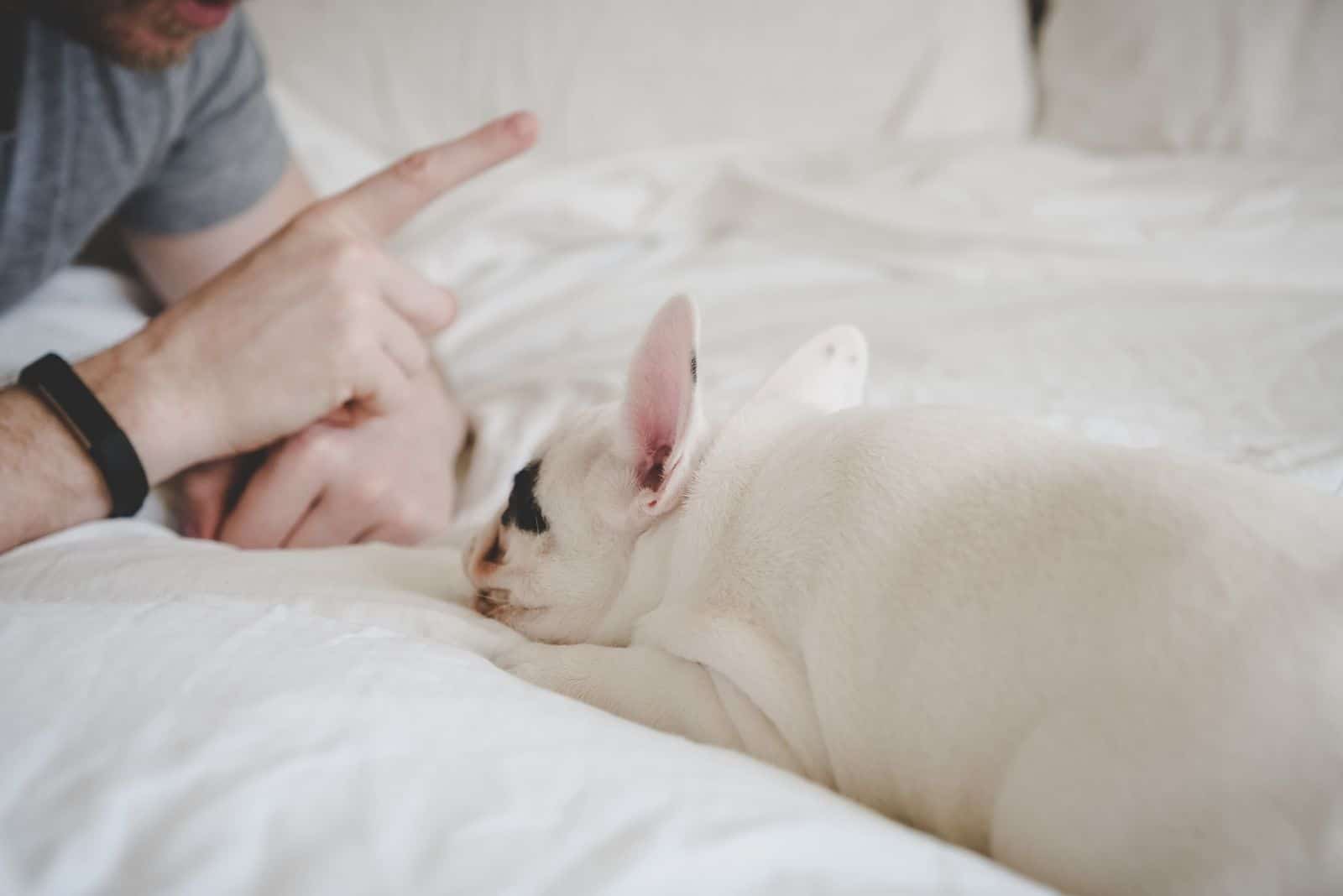
Potty training (or house training) is an essential part of getting a new dog, but it can be pretty stressful!
So, how can you overcome this problem and stay sane?
The key is to be determined and consistent. The other thing is to start training your pup as soon as you get them home. Experts agree that potty training should take place between 12 and 16 weeks*, but there’s no harm in starting early. In fact, good breeders begin the process for you to make it easier.
*The pup has more control over its bladder and bowels by this time.
The most commonly asked question on this subject is this: how long does it take to potty train a dog?
Most dogs will be fully house trained within four to six months, although some can take up to a year. Smaller dogs can take longer as they have tiny bladders and rapid metabolism, and they can also be pretty stubborn!
There are several different approaches, and you can choose one that works for you.
Even so, there are plenty of ways to speed up the process and ensure that things go smoothly:
• Keep to a regular schedule – feeding your pup at fixed times will help its body clock stay in sync with your daily schedule. You’ll know roughly when your puppy needs to ‘eliminate’ and will be ready to act. Follow this routine as closely as possible.
• Use the same spot – when your pup needs to go, always use the same outside area. Scent markers in their feces will increase their urge to poop. Don’t worry; you can clear up any existing poop, and the scent will stay.
• Watch for the signs! – if you notice your pup whining, sniffing, or circling, then it might be ready to go, so act quickly!
• Don’t punish your pup – accidents happen. Your puppy will poop in the wrong place at some point. Angry shouting won’t help, and smacking is cruel and counterproductive. Your pup won’t connect your rage with the incident and become confused. As for the old method of rubbing the dog’s nose in it, the less said, the better, as it is nothing short of abuse. If you catch them in the act, make a loud noise (clapping usually works) to distract them and get them outside quickly.
• Invest in a bio-enzymatic cleaner – when the inevitable accident happens, these cleaners remove any traces of odor. As we already mentioned, dogs have scent markers in their pee and poop and often find the same spot. Enzymatic cleaners break down the scent so the dog won’t detect it.
• Allow plenty of time – if you rush them, they may not finish what they’re doing, only to complete the process indoors! Be patient and let your dog do what it needs to do. Some experts suggest using a command word to speed things up.
• Invest in a dog crate – crate training is excellent when done correctly. The crate provides a safe space for your furry friend, and few dogs like to pee or poop where they eat and sleep. Choose a big enough crate but not so big that there’s space to use as a bathroom! If you don’t use a crate, confine your pup to one room (if possible) until potty training is completed. Note: don’t leave your dog in a crate all day and only let them out for toilet breaks, as they will become bored and frustrated.
• Reward your pup! – Although some experts warn against rewarding pups with food treats while potty training, it’s okay to do, as long as you pick your moment. Some dogs will be so keen to get the treat that they’ll forget to do their business. Rewards don’t have to be food-oriented. If your pup does well, you can pet him and praise him or take him for a walk. Positive reinforcement always gets good results.
• Don’t carry your pup outside – your puppy will expect you to know that he needs to go and will wait for you to carry him every time. If you don’t see the signs, he’ll likely have an accident. He needs to learn to head to the door by himself and tell you that he needs the bathroom.
When you begin this process, it’s a good idea to take your puppy out first thing in the morning. After this, you should encourage them to go roughly once every hour or two throughout the day.
You can decrease this as the days go by and they get used to going outside, but a puppy needs to go to the bathroom at least six times a day for about the first month.
Finally, take them out last thing at night before you put them to bed, and you’ll be much less likely to have your sleep disturbed.
Most intelligent dog breeds get the hang of it pretty quickly, so don’t give up!
When do puppies get easier? They’re usually better after the teething stage and once they’re potty trained.
My Puppy Won’t Stop Crying At Night
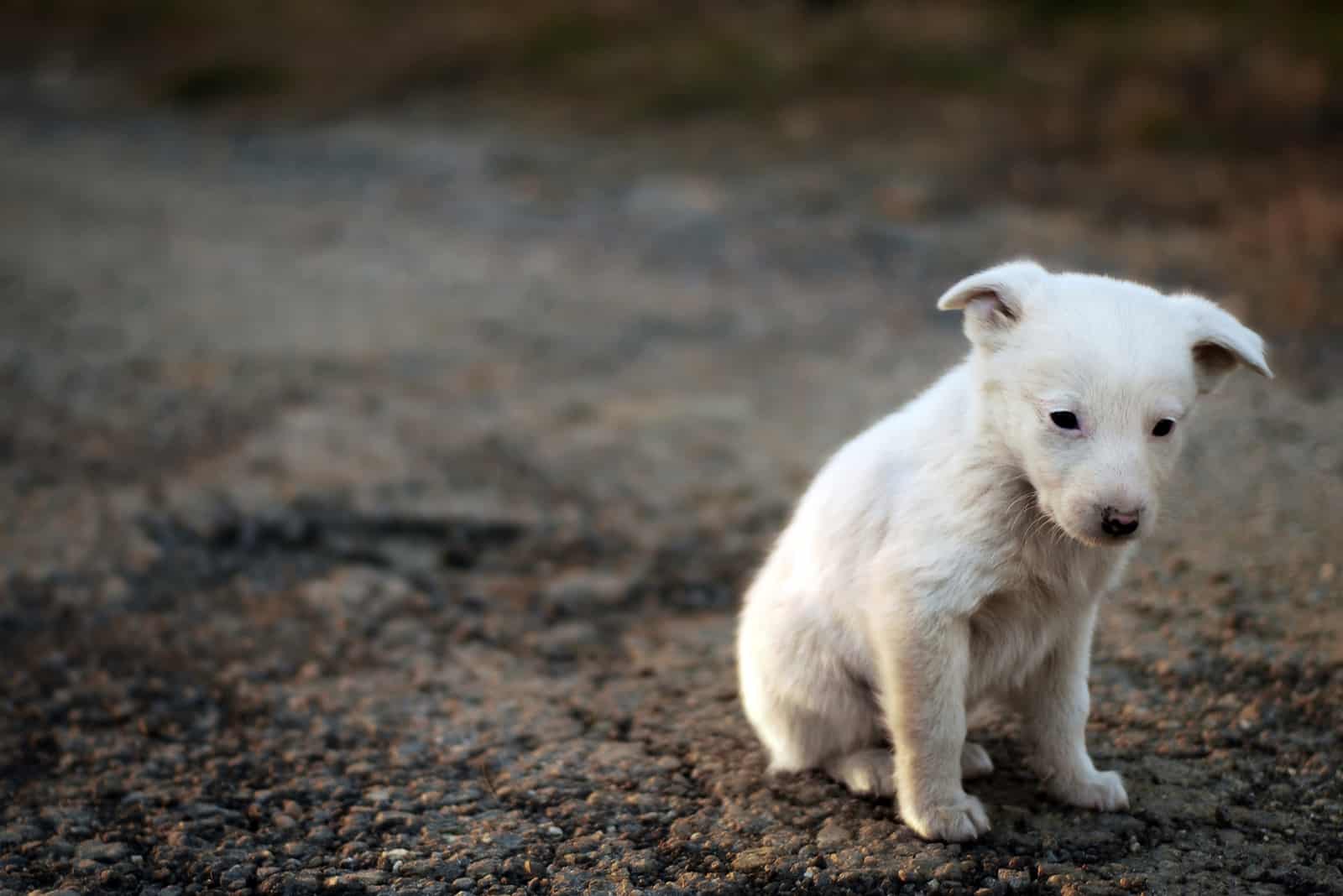
We’ve all been there! Millions of dog owners wonder, will my puppy sleep through the night soon?
Don’t worry, they will eventually do so, but you need to understand why they are crying so you can do something about it.
Here are some suggestions as to why a puppy might be crying, along with some solutions:
• It is lonely – An 8-week old puppy has just been taken from its mother and littermates, and it misses them. It’s in a new home, and everything is strange. You can try moving its bed closer to yours, so it has company. You might also try using up its energy levels with a long walk or vigorous playtime during the evening. Some breeders send a toy or blanket with the scent of the pup’s mom and siblings, which helps to comfort them.
• It is in pain – it could be the dreaded teething stage, tummy ache, earache, etc. Once you’ve ruled out everything else, if they don’t stop crying, it’s time for a visit to the vet.
• It needs a bathroom break – as pointed out already, it is advisable to take your pup out to pee and poop right before bedtime. Still, there is a chance that they’ll need to go on the odd occasion, especially in the first stages of potty training. Don’t get cross with your pup if it disturbs your sleep, as this will set them back and hinder any progress you’ve made.
• It wants to play – puppies live to play, particularly high-energy breeds that never seem to slow down! This is why a regular schedule is handy. Although you can be flexible, try to stick to a timetable that includes the pup’s playtimes, at least until it is an adult. Again, you should try to wear out your puppy as much as possible during the day.
What Age Do Puppies Get Better Behaved?
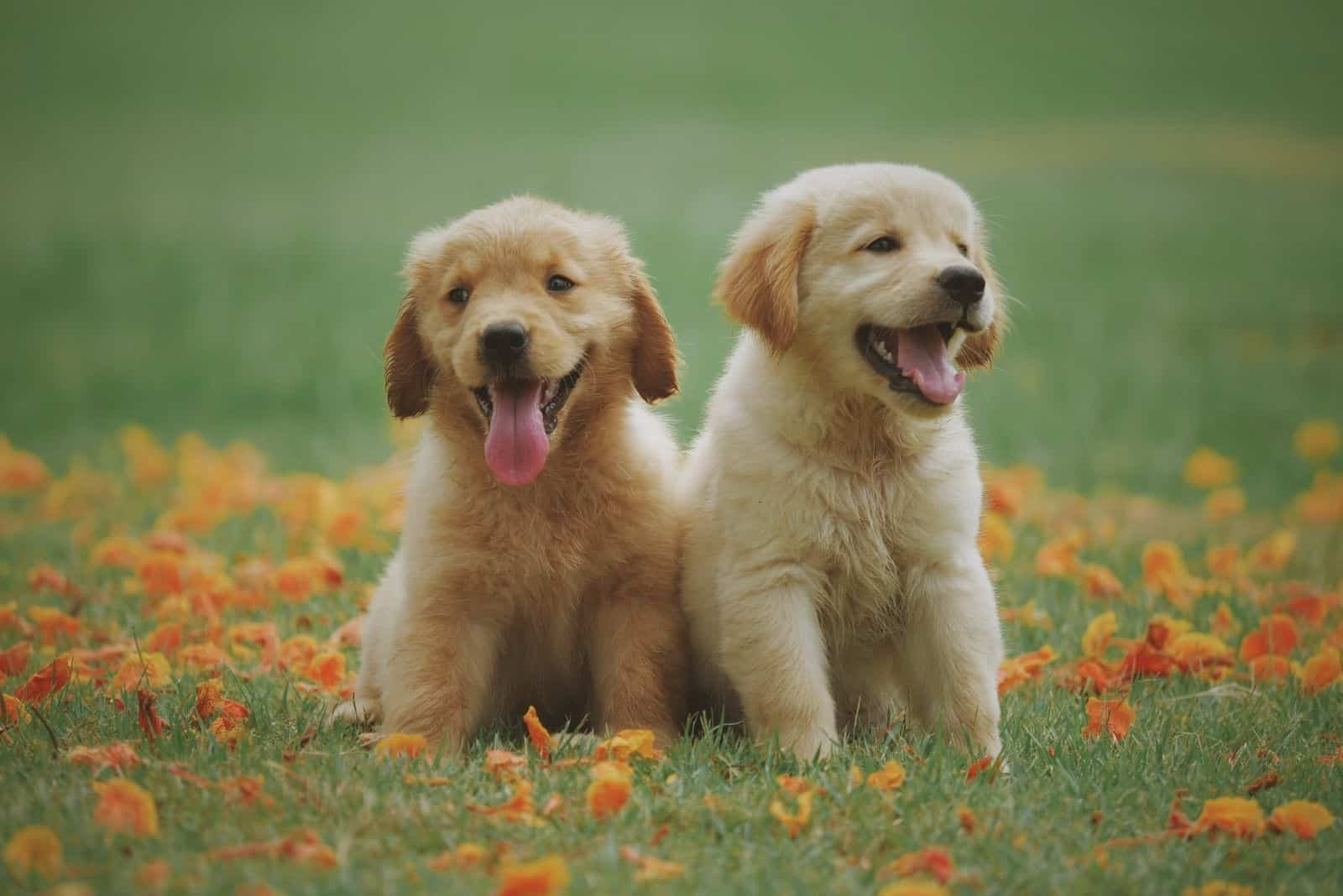
Most dogs typically start to mature between 9 and 18 months. Again, small breeds mature quicker than large breeds.
Some dogs never seem to grow up! You’ll see puppyish behavior at any stage of their lives, even in old dogs. While this is cute to see, it’s never fun when your dog misbehaves.
This is the heart of the problem: while we love to see puppies being puppies, bad behavior is unwelcome and stressful.
The best way to eliminate bad behavior is through dog training and socialization.
Both of these are essential if you want a well-behaved adult dog, and the sooner you begin, the better. As with potty training, most good breeders will have already started the training process before the pup leaves its mother.
Some breeders also expose the pups to a variety of experiences, sounds, smells, and sights. Familiarizing them with these things helps the puppies to have a more positive attitude toward other dogs, people, animals, and various situations.
Puppy Training
If possible, enroll in dog training classes sometime between the ages of 12 and 16 weeks, once they have completed their vaccinations. A professional dog trainer might seem expensive, but it’s well worth the investment once you see the transformation in your best friend’s behavior!
Puppy classes or puppy kindergarten are another great way of modifying your pup’s behavior. As well as learning obedience, young puppies get to socialize and learn to play nicely with other dogs.
A well-trained and well-adjusted dog is a joy to meet and even better to own! The first year may be challenging, but you will get there with a bit of effort.
Spaying And Neutering
Many breeders include a spay/neuter clause in the sales agreement for each pup. The buyer is bound to have their pup ‘fixed’ by a specific date or face a penalty.
The idea is to reduce unwanted litters, although there is another reason: spaying and neutering can calm dogs down and reduce the risk of some types of cancer.
In fairness, research also suggests that spaying and neutering too early, or at all, increases the risk of other cancers and severe health conditions. However, popular opinion favors spaying or neutering for the moment.
It’s wrong to view this procedure as a cure-all, as there are no guarantees that it will have the desired effect. However, dog owners have found that their pet is much calmer after the surgery in many cases.
How does this work?
Dogs often become sexually mature months before they are fully developed physically (again, this process is delayed in bigger breeds). They can become frustrated as natural urges take over, leading to unwanted behavior such as humping. Some dogs can become aggressive, and female dogs are often moody and unpredictable when in heat.
Male dogs can detect the scent of a female in heat up to three miles away. They can become a real handful when this happens. You might be shocked at the change in their personality, and don’t be at all surprised when they perform a Houdini act and disappear!
So, by all means, get your dog fixed. In all likelihood, it will calm them down and stop any undesirable sex-related behavior, but don’t rule it out completely.
When Do Puppies Get Easier? Final Thoughts
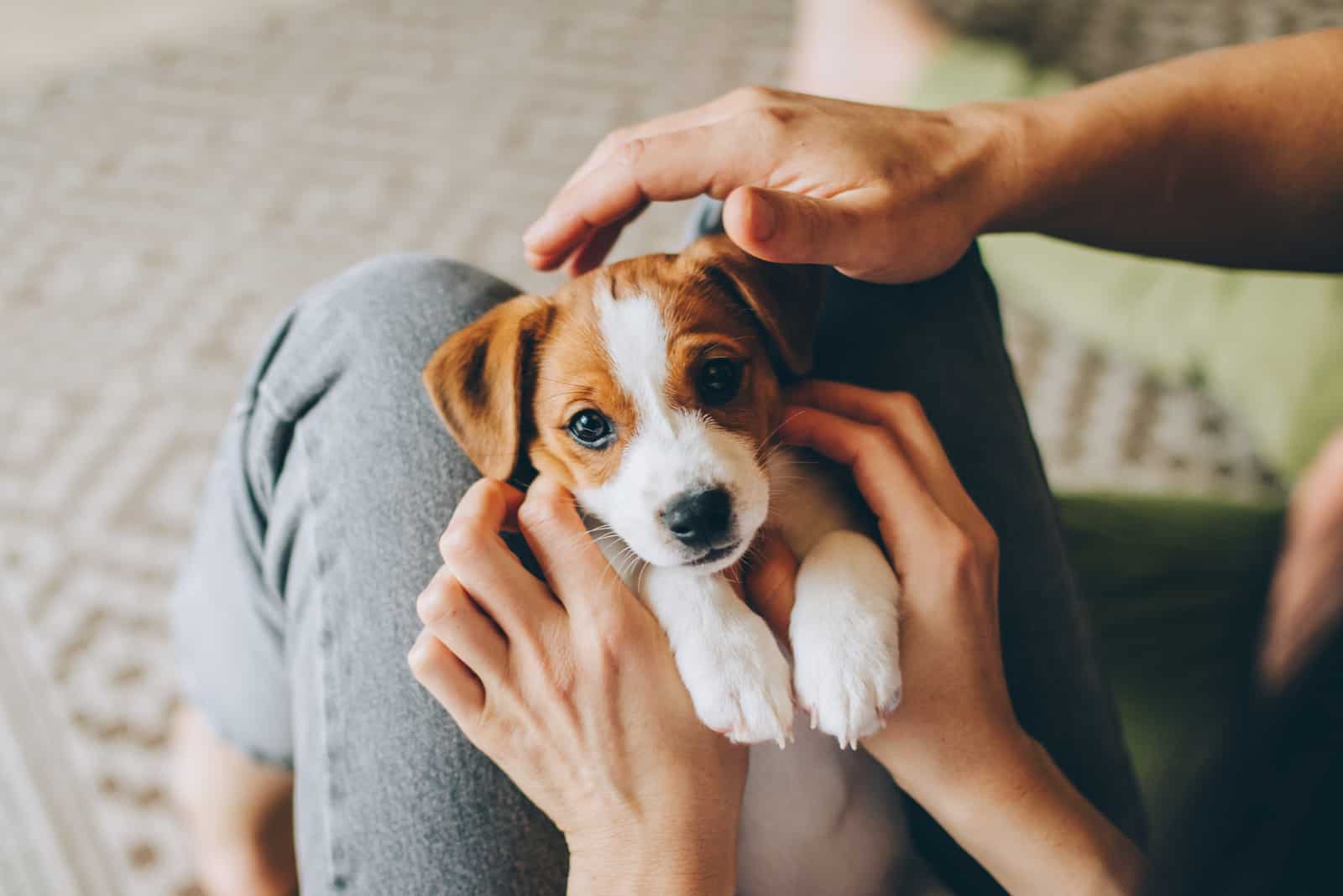
We’ll wrap things up now, as you’ve probably finished your coffee (or perhaps you had something stronger!).
Hopefully, have a better understanding of your pup’s behavior, and we’ve convinced you that things will get easier in time.
Above all, it should help you remember why you got a pup in the first place.
The first couple of weeks are tough, without a doubt, but things will get better as your pup learns to trust you and the bond between you grows stronger.
Your pup will go through teething, chewing, growth spurts, sexual maturity, and toilet training during the first few months. These times will test your patience and willpower, but they will pass.
Your job is to guide your pup through these times and ensure they get the care and support they need. You need to train and socialize your puppy to prepare them for adulthood.
Yes, puppies can be a lot of work, but they are totally worth it. Once the worst is passed, this new family member will enrich your life with love, affection, fun, and laughter for years to come.
Read Next:
• 10+ Tips For Puppy Schedule Every Dog Owner Needs
• What Does A Normal Puppy Belly Look Like? 4 Ways To Tell

